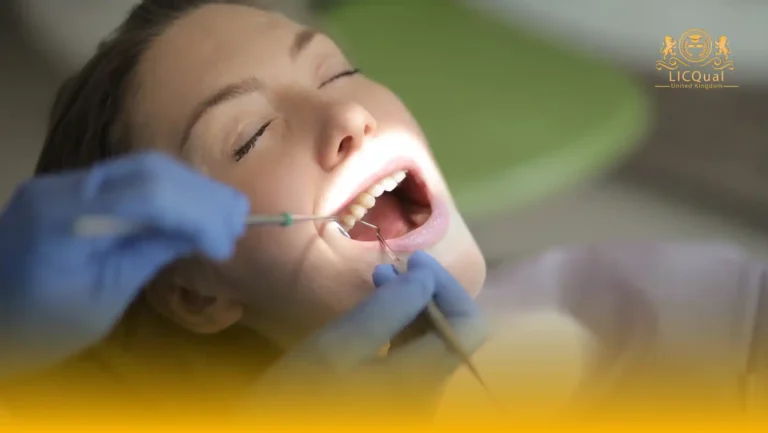The LICQual Level 3 Diploma in Allergy and Immunology (Dip AI) is a specialised qualification designed for healthcare and medical professionals seeking to deepen their expertise in the fields of allergy and immunology. This advanced programme is tailored for learners who already have foundational knowledge and practical experience in healthcare and wish to enhance their career prospects, broaden their clinical understanding, and strengthen their Continuing Professional Development (CPD).
This diploma provides an in-depth exploration of key concepts in allergy and immunology, including the mechanisms of immune responses, identification and management of allergic conditions, and the application of evidence-based practices in clinical settings. Learners will gain practical insights, develop critical thinking skills, and acquire the ability to implement best practices in patient care, improving outcomes for individuals with allergic and immunological disorders.
To ensure a high-quality learning experience and learner success, centres delivering this qualification must be equipped with competent and qualified staff, alongside comprehensive teaching materials and practical resources. Such standards guarantee that learners receive robust instruction, hands-on experience, and effective guidance throughout the course.
By completing the LICQual Level 3 Diploma in Allergy and Immunology, learners not only expand their professional knowledge but also enhance their credibility in the healthcare sector, positioning themselves for advanced roles, specialist responsibilities, and continued professional growth. This qualification is an ideal step for committed professionals aiming to make a meaningful impact in patient care and the wider field of immunology.
Course Overview
Qualification Title
LICQual Level 3 Diploma in Allergy and Immunology (Dip AI)
Total Units
6
Total Credits
60
GLH
240
Qualification #
LICQ2200904
Qualification Specification
To enroll in the LICQual Level 3 Diploma in Allergy and Immunology (Dip AI) , applicants must meet the following criteria:
|
Qualification# |
Unit Title |
Credits |
GLH |
|---|---|---|---|
|
LICQ2200904-1 |
Introduction to Allergy and Immunology |
10 |
40 |
|
LICQ2200904-2 |
Types of Allergic Reactions |
10 |
40 |
|
LICQ2200904-3 |
Clinical Assessment and Diagnosis |
10 |
40 |
|
LICQ2200904-4 |
Management of Allergic Conditions |
10 |
40 |
|
LICQ2200904-5 |
Advanced Immunology and Research |
10 |
40 |
|
LICQ2200904-6 |
Professional Practice and CPD in Allergy & Immunology |
10 |
40 |
By the end of this course, learners will be able to:
Unit 1: Introduction to Allergy and Immunology
By the end of this unit, learners will be able to:
- Explain the structure and function of the human immune system.
- Describe the basic principles of immunology and immune responses.
- Identify the main types of allergies and common immunological disorders.
- Discuss the role of the immune system in maintaining health and responding to disease.
Unit 2: Types of Allergic Reactions
By the end of this unit, learners will be able to:
- Differentiate between IgE-mediated and non-IgE-mediated allergic reactions.
- Explain the mechanisms underlying hypersensitivity reactions.
- Recognise the clinical features of common allergic conditions.
- Evaluate diagnostic methods used to identify allergic reactions.
Unit 3: Clinical Assessment and Diagnosis
By the end of this unit, learners will be able to:
- Conduct accurate patient history taking with a focus on allergic and immunological symptoms.
- Interpret results from diagnostic tests, including skin prick and blood tests.
- Identify indicators for further specialist referral in allergy and immunology cases.
- Apply evidence-based approaches to clinical assessment in allergy management.
Unit 4: Management of Allergic Conditions
By the end of this unit, learners will be able to:
- Explain pharmacological and non-pharmacological treatment options for allergies.
- Develop patient management plans including prevention, lifestyle adjustments, and monitoring.
- Assess the effectiveness of treatment interventions for allergic and immune disorders.
- Demonstrate awareness of emergency management for severe allergic reactions.
Unit 5: Advanced Immunology and Research
By the end of this unit, learners will be able to:
- Explain advanced concepts in immunology, including autoimmune conditions and immunodeficiencies.
- Analyse current research and emerging trends in allergy and immunology.
- Apply research findings to clinical practice to improve patient care.
- Critically evaluate evidence-based practices in the management of immunological conditions.
Unit 6: Professional Practice and CPD in Allergy & Immunology
By the end of this unit, learners will be able to:
- Demonstrate understanding of professional and ethical responsibilities in allergy and immunology practice.
- Apply principles of patient safety, confidentiality, and multidisciplinary teamwork.
- Develop a personal Continuing Professional Development (CPD) plan to enhance professional skills.
- Reflect on practice to identify areas for improvement and professional growth.
The LICQual Level 3 Diploma in Allergy and Immunology (Dip AI) is designed for healthcare professionals, medical graduates, and allied practitioners who want to specialize in the diagnosis, treatment, and management of allergic and immune-related conditions. This CPD-accredited diploma is ideal for those seeking career advancement, international recognition, and flexible online training that equips them with evidence-based skills to manage asthma, food allergies, autoimmune disorders, and other immune system conditions.
1. Medical Doctors and Physicians
- Strengthen diagnostic and treatment skills in allergy and immunology
- Gain advanced knowledge of asthma, food allergies, and autoimmune diseases
- Apply evidence-based approaches to immune system care
- Improve patient outcomes with specialized training in allergy management
- Enhance professional credibility with an accredited diploma
2. Nurses and Clinical Practitioners
- Develop expertise in managing patients with allergic and immune disorders
- Learn patient-centered care strategies for asthma and hypersensitivity
- Expand clinical scope with a Diploma in Allergy and Immunology (Dip AI)
- Access CPD-accredited training for career progression
- Gain confidence in supporting multidisciplinary healthcare teams
3. Allied Health Professionals
- Suitable for dietitians, pharmacists, and laboratory technologists
- Understand the role of nutrition and medication in immune health
- Support patients with long-term allergy and autoimmune conditions
- Strengthen interprofessional collaboration in healthcare delivery
- Add a specialized qualification to enhance career opportunities
4. Medical Graduates and Postgraduate Students
- Build a strong foundation in allergy and immunology for future specialization
- Gain a competitive edge in postgraduate medical applications
- Access flexible online learning while continuing clinical rotations
- Learn from expert-led modules aligned with international standards
- Earn a diploma that strengthens both academic and professional profiles
5. Public Health Specialists and Researchers
- Understand the global impact of allergy and immune disorders on healthcare systems
- Gain insights into prevention, screening, and disease management strategies
- Learn about population-level interventions for asthma and allergy care
- Strengthen leadership skills in public health policy and planning
- Contribute to international health initiatives and immunology research
6. International Healthcare Professionals
- Designed for global learners seeking UK-accredited qualifications
- Access flexible online study from anywhere in the world
- Gain recognition with an internationally respected diploma
- Learn best practices in allergy and immunology aligned with global standards
- Enhance employability in hospitals, clinics, and global health organizations
7. Professionals Seeking Career Advancement
- Ideal for those aiming to specialize in allergy and immunology
- Boost career growth with a niche medical qualification
- Gain recognition for advanced clinical expertise in immune system care
- Open pathways to leadership, teaching, and research roles
- Strengthen your CV with a Diploma in Allergy and Immunology (Dip AI)
To deliver the LICQual Level 3 Diploma in Allergy and Immunology effectively, training centres must meet specific requirements to ensure high-quality education, practical learning, and learner success. These requirements include:
- Qualified and Competent Staff: Centres must employ instructors with relevant qualifications, clinical experience in allergy and immunology, and expertise in delivering Level 3 healthcare programmes. Staff should be capable of providing both theoretical instruction and practical guidance.
- Adequate Learning Resources: Centres must provide comprehensive learning materials, including textbooks, digital resources, case studies, and access to up-to-date research in allergy and immunology.
- Practical Facilities and Equipment: Centres should have appropriate clinical simulation facilities, diagnostic tools, and laboratory equipment to support hands-on training and practical assessment of learners.
- Safe and Accessible Learning Environment: Training environments must comply with health and safety standards, offering a safe, clean, and fully accessible space for all learners.
- Assessment and Quality Assurance Processes: Centres must implement robust systems for learner assessment, feedback, and progression monitoring to maintain high academic standards and regulatory compliance.
- Support for CPD and Professional Development: Centres should encourage continuous professional development by providing access to workshops, seminars, and additional learning opportunities relevant to allergy and immunology.
- Administrative and Logistical Support: Centres must have efficient administrative processes, including enrolment management, record-keeping, and support services to assist learners throughout their course journey.
Meeting these centre requirements ensures that learners receive a high-quality, structured, and professionally recognized Level 3 qualification, equipping them with the knowledge, skills, and confidence to advance in their careers in allergy and immunology.
Assessment and Verification
All units within this qualification are subject to internal assessment by the approved centre and external verification by LICQual. The qualification follows a criterion-referenced assessment approach, ensuring that learners meet all specified learning outcomes.
To achieve a ‘Pass’ in any unit, learners must provide valid, sufficient, and authentic evidence demonstrating their attainment of all learning outcomes and compliance with the prescribed assessment criteria. The Assessor is responsible for evaluating the evidence and determining whether the learner has successfully met the required standards.
Assessors must maintain a clear and comprehensive audit trail, documenting the basis for their assessment decisions to ensure transparency, consistency, and compliance with quality assurance requirements.







